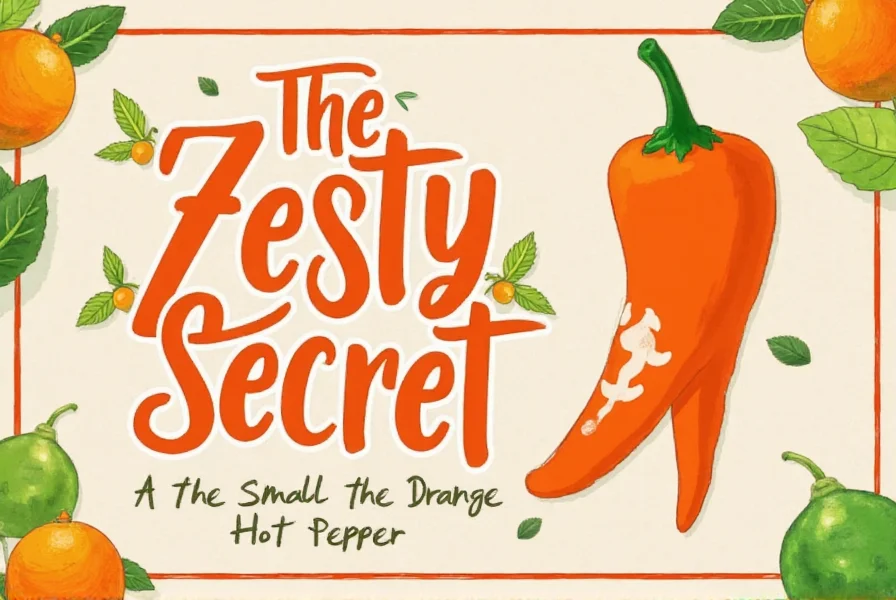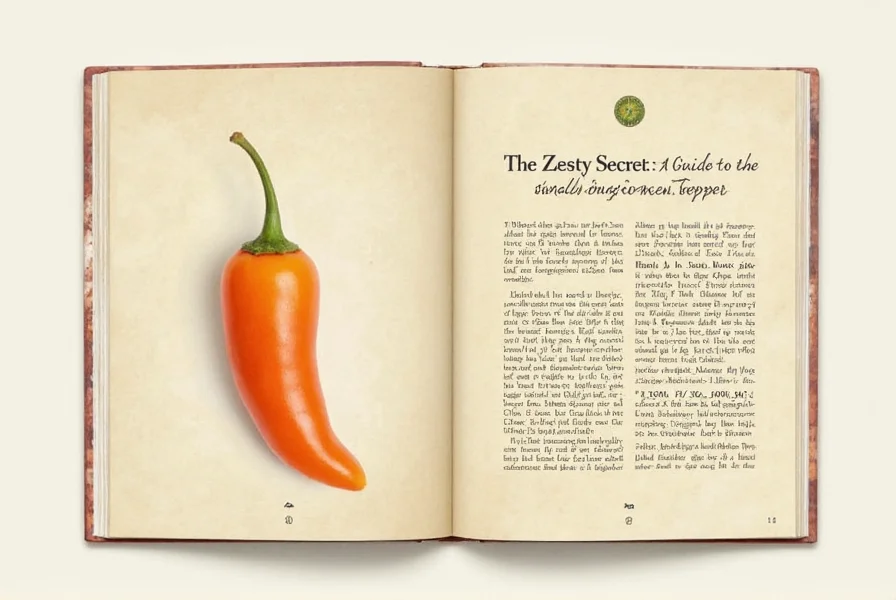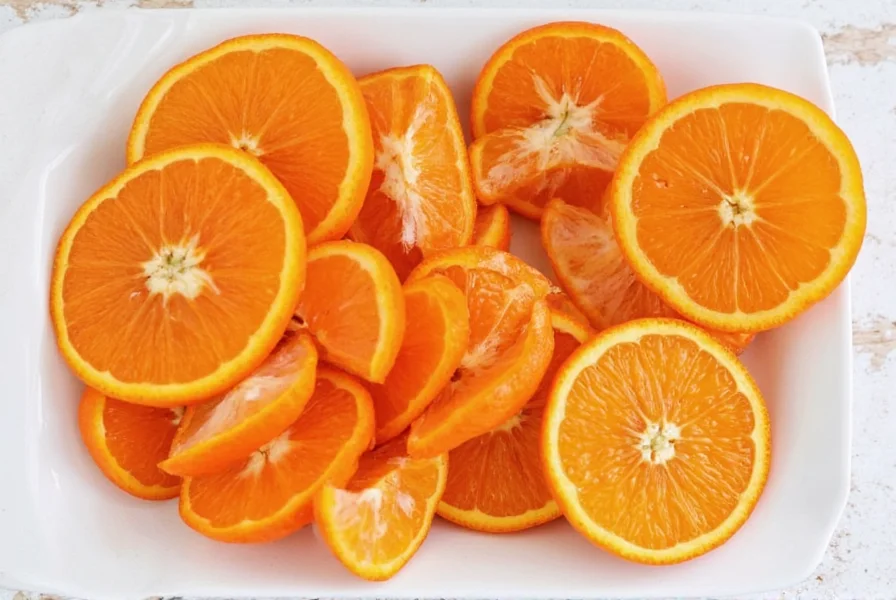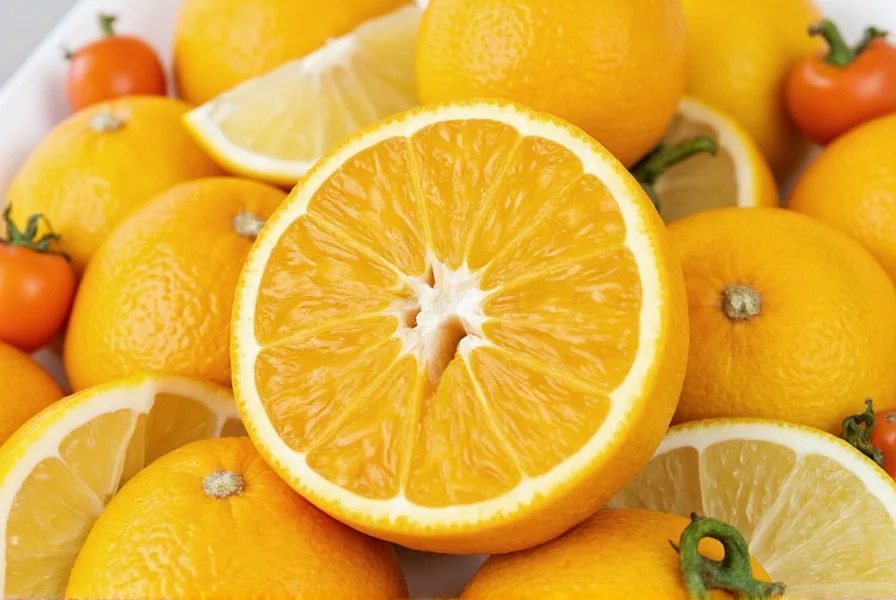Table of Contents
- How Hot Are Small Orange Hot Peppers? (Scoville Scale Explained)
- Small Orange Hot Pepper vs Habanero vs Jalapeño: Heat Comparison
- Flavor Profile and Best Culinary Uses
- Growing Small Orange Hot Peppers: Complete Home Gardening Guide
- Proper Storage Methods to Extend Freshness
- Where to Buy and What to Look For
- Frequently Asked Questions (Quick Reference)
How Hot Are Small Orange Hot Peppers? (Scoville Scale Explained)
Small orange hot peppers measure between 50,000-100,000 Scoville Heat Units (SHU), placing them firmly in the medium-high heat range. This makes them 10-20 times hotter than jalapeños (2,500-8,000 SHU) but noticeably milder than the hottest habanero varieties, which can reach up to 350,000 SHU. If you're wondering whether these peppers are right for your spice tolerance, they deliver a significant kick that builds gradually but remains manageable for most heat enthusiasts.

Small Orange Hot Pepper vs Habanero vs Jalapeño: Heat Comparison
| Pepper Variety | Scoville Heat Units (SHU) | Heat Level Description | Best For |
|---|---|---|---|
| Small Orange Hot Pepper | 50,000-100,000 | Medium-high heat with gradual build-up and sweet finish | Salsas, hot sauces, fruit-based dishes |
| Habanero (standard) | 100,000-350,000 | Intense, immediate heat with fruity undertones | Extreme hot sauces, Caribbean cuisine |
| Jalapeño | 2,500-8,000 | Mild to moderate heat with grassy flavor | Popper appetizers, nachos, mild salsas |
| Serrano | 10,000-23,000 | Sharp, bright heat that hits quickly | Pico de gallo, guacamole, sauces |
Unlike many hot peppers that deliver immediate intense heat, small orange hot peppers provide a more balanced heat experience—starting with subtle warmth that builds to a manageable peak before fading with a pleasant, slightly sweet aftertaste. This characteristic makes them particularly versatile in cooking compared to habaneros, which often overwhelm other flavors with their intense heat.

Flavor Profile and Best Culinary Uses
The small orange hot pepper's unique selling point is its perfect balance of sweetness and heat. When fully ripe (bright orange color), these peppers develop complex fruity notes that complement their medium-high heat level. The flavor profile includes:
- Sweet tropical notes reminiscent of mango and apricot
- Subtle citrus undertones that brighten dishes
- Earthy background that adds depth without bitterness
- Gradual heat build-up that doesn't overwhelm other ingredients
Unlike habaneros that often dominate a dish with their intense heat, small orange hot peppers enhance rather than overpower other flavors. This makes them ideal for:
Top 5 Culinary Applications
- Tropical fruit salsas - pairs perfectly with mango, pineapple, and papaya
- Fish and seafood dishes - enhances ceviche and grilled fish without overwhelming delicate flavors
- Chocolate-based recipes - creates sophisticated spicy chocolate sauces and desserts
- Vibrant hot sauces - produces balanced sauces that showcase complexity rather than just heat
- Citrus-based marinades - combines beautifully with lime, orange, and lemon

Growing Small Orange Hot Peppers: Complete Home Gardening Guide
Growing small orange hot peppers at home ensures the freshest, most flavorful peppers while giving you control over their heat level. These peppers typically mature from green to vibrant orange in 70-90 days after transplanting.
| Growing Factor | Optimal Conditions | Critical Mistakes to Avoid |
|---|---|---|
| Soil Requirements | Well-draining soil with pH 6.0-7.0; mix in compost for nutrients | Heavy clay soils that retain too much moisture causing root rot |
| Watering Schedule | 1-1.5 inches per week; consistent moisture but never soggy | Inconsistent watering causing blossom end rot or fruit splitting |
| Sunlight Needs | Minimum 6-8 hours direct sunlight daily | Partial shade reducing fruit production and heat intensity |
| Temperature Range | 70-85°F (21-29°C) daytime; above 55°F (13°C) at night | Cold temperatures stunting growth or killing young plants |
| Fertilizing Strategy | Balanced fertilizer every 3-4 weeks; switch to high-potassium when flowering | Excessive nitrogen causing leafy growth but few peppers |
Harvesting at Peak Flavor
For the sweetest, most flavorful small orange hot peppers:
- Harvest when peppers turn uniform bright orange (not just partially orange)
- Peppers should feel firm but slightly yielding to gentle pressure
- Use sharp scissors to cut stems, leaving a small portion attached to the pepper
- Never pull peppers off by hand, which can damage the plant

Proper Storage Methods to Extend Freshness
Maximize your small orange hot peppers' shelf life with these professional storage techniques:
Short-Term Storage (1-3 weeks)
- Store unwashed peppers in a paper bag in the vegetable crisper drawer
- Maintain humidity around 85-90% for optimal freshness
- Do not wash until ready to use (moisture accelerates spoilage)
- Check daily and remove any softening peppers to prevent spread
Long-Term Preservation Methods
- Freezing whole: Place clean, dry peppers in freezer bags with air removed - maintains flavor for 6-8 months (texture softens when thawed)
- Drying: String peppers on thread and hang in warm, dry, dark place with good airflow (takes 2-3 weeks)
- Vinegar preservation: Create hot sauce base by covering peppers with 5% acidity vinegar (lasts 1+ year refrigerated)
- Oil preservation: Submerge in high-quality olive oil with garlic (refrigerate and use within 1 month for safety)

Where to Buy and What to Look For
When purchasing small orange hot peppers from markets, use this checklist to ensure quality:
| Quality Indicator | What to Look For | Avoid These Signs |
|---|---|---|
| Color & Appearance | Bright, uniform orange color; glossy skin | Patches of green, brown spots, or dull appearance |
| Firmness | Firm to the touch with slight give | Soft spots, wrinkles, or mushy areas |
| Stem Condition | Fresh, green stem firmly attached | Dry, brown, or detached stems |
| Size Consistency | Uniform size within the same container | Mixed sizes indicating inconsistent ripeness |
Top Recommended Products
- Trusted Seed Suppliers: Pepper Joe's, Baker Creek Heirloom Seeds, and Seed Savers Exchange offer reliable small orange hot pepper seeds
- Premade Hot Sauces: Look for "Mad Dog 357 Small Batch" or "Queen Majesty Orange" for authentic small orange hot pepper flavor
- Growing Kits: The "Hot Pepper Lover's Kit" from Burpee includes specialized soil and fertilizer for optimal results

Frequently Asked Questions (Quick Reference)
How hot are small orange hot peppers compared to habaneros?
Small orange hot peppers (50,000-100,000 SHU) are noticeably milder than standard habaneros (100,000-350,000 SHU). While both belong to the same species (Capsicum chinense), small orange varieties typically have a more balanced heat profile with less intense initial burn and a sweeter finish.
What's the best way to reduce the heat when cooking with small orange hot peppers?
To reduce heat: (1) Remove all white membranes and seeds where capsaicin concentrates, (2) Pair with dairy (yogurt, sour cream), (3) Add sweet elements (honey, fruit), (4) Use acidic components (lime juice, vinegar) to balance heat perception. Start with half a pepper per dish and adjust to taste.
Can I substitute small orange hot peppers for habaneros in recipes?
Yes, but use 1.5-2 times the amount of small orange hot peppers to achieve similar heat levels. Since small orange peppers have a more subtle heat and pronounced sweetness, they work particularly well in fruit-based recipes where habaneros might be too intense.
Why do my homegrown small orange hot peppers vary in heat level?
Heat variation comes from multiple factors: water stress (drought increases heat), soil nutrients (low nitrogen increases heat), amount of sunlight, and maturity at harvest. For more consistent heat, maintain regular watering and harvest at the same stage of ripeness (full orange color).
How can I safely handle small orange hot peppers without burning my skin?
Always wear nitrile gloves when handling, especially when cutting or seeding. Avoid touching your face, and wash hands thoroughly with soap and cold water afterward. If you get pepper oil on skin, use milk or oil to break down capsaicin before washing.
The small orange hot pepper offers the perfect balance between manageable heat and complex flavor that many cooks seek but struggle to find. By understanding its heat profile (50,000-100,000 SHU), culinary applications, and proper handling techniques, you can elevate your cooking with confidence. Whether you're growing your own or selecting the best specimens at the market, this versatile pepper adds dimension to dishes without overwhelming other ingredients—a quality that sets it apart from more intense hot pepper varieties.












 浙公网安备
33010002000092号
浙公网安备
33010002000092号 浙B2-20120091-4
浙B2-20120091-4